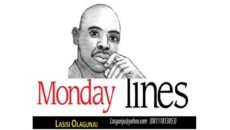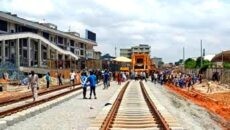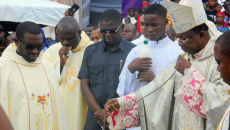…When judges are unable and unwilling to defend their independence and the rule of law, that’s the surest way to enable the enthronement of an autocratic government – Nosa Igiebor
Time is the unerring teacher of things unknown. What was not clear yesterday would become obvious tomorrow. Five years ago, millions of Nigerians gave Muhammadu Buhari the benefit of doubt over his phantom school certificate. And he got elected president without presenting any evidence to back his claim of having the certificate.
During the politically febrile months preceding the 2015 general elections, when Buharimania enveloped the country, his fanatical supporters and even the new converts to the Buhari cult, spewed out loads of inanities. Many said that even if he presented NEPA bill as his certificate, they would still vote for him.

For them, it was irrelevant that the certificate might not exist, and that he lied under oath that the document was in the office of the secretary of the Army Board. A claim the board categorically walked back in 2015, when it said Buhari’s file didn’t contain any copy of the certificate he claimed. All the board had in the file was a letter from the principal of his secondary school in Katsina, saying that, if he wrote the West African School Certificate examination, he would score credit in about five or six subjects.
In a stark contrast to the UK Supreme Court, the PEPT delivered an 8-hour rambling judgement that was long on obfuscating technicalities and critically short on logic and legal illumination.
Through a brilliantly executed media blitz, the opposition All Progressives Congress, APC, succeeded in selling the narrative to a gullible public, that President Goodluck Jonathan was ‘clueless and his government riddled with corruption’. They eulogised Buhari as ‘Mr. Integrity’ whose words, claims and promises were bankable any day anywhere.
But unlike Buhari who still cannot locate and present his WASC document, Jonathan’s academic qualifications were never in any doubt, as he had validly documented records to affirm his claim. Now, between a president who has a PhD in science, and one who made a false claim of having a school certificate, who is more clueless and more lacking in integrity?
NEPA will cut your light if you fail to pay your bill. The electricity distribution companies, DISCOS, won’t accept a mere declaration that you have paid your bill, say, to the bank. To prevent disconnection, you need to provide verifiable, documented evidence of the payment. Otherwise, you lose your power supply.
Unlike NEPA that won’t accept a mere declaration of payment of its bills in place of valid receipt or any other document for same, our supposedly learned judges have come up with a baffling interpretation of the law. They say that you are not obliged to present any certificate to contest any election in Nigeria. All you need do is just tell the Independent National Electoral Commission, INEC, that you went to school and you have a certificate without anything to back up the claim. Thereafter, you are automatically qualified to be registered by INEC to contest elections. This preposterous judicial assertion would have been utterly laughable were it not for the serious damage it has done, and will continue to do, to our electoral process if the Supreme Court doesn’t correct it.
The sheer illogicality of the Presidential Election Petition Tribunal’s conclusion, particularly in respect of Buhari’s controversial certificate claim, defies credulity. The panel, in a bizarrely triumphal unanimity, affirmed that two distinctly different documents are one and the same. The attestation letters or ‘statements of results’ of Buhari from the West African Examinations Council and the Cambridge School Certificate Examinations Board bear different names, different number of subjects, and one of the subjects has different scores in the two documents. What kind of legal benchmark in determining someone’s academic qualification has the panel set by its conclusion that Buhari was “eminently qualified” to contest the election?
This is in spite of the fact that, his lead witness, Major General (rtd.) Paul Tarfa unequivocally debunked his claim that the Army Board had his certificate. Tarfa, to the embarrassment of Buhari’s legal team, told the tribunal that they didn’t submit their certificates to the army authorities when they were recruited, as they were not asked to do so. The obvious implication of Tarfa’s testimony is that Buhari lied under oath in the affidavit he swore to, affirming his claim about the location of his certificate. But this didn’t make any impression on the judges. Maybe they chose to deliberately ignore it in their bid to give life or, to borrow a legal term, “probative value” to a certificate that has assumed phantom characteristic. Just as they ignored, and allowed INEC to get away with, the large-scale criminal enterprise it turned the presidential/National Assembly elections into.
On Tuesday, September 23rd, the United Kingdom Supreme Court gave a unanimous verdict that Prime Minister Boris Johnson’s prorogation (suspension) of parliament (the Houses of Commons and the Lords) for five weeks was “unlawful, null and void” because the reasons he gave for doing so were not justifiable. The 11 judges directed that the parliament should be reconvened immediately.
Their interpretation of the law and convention the prime minister relied upon to muzzle the parliament, was constructive and forward-looking. It was delivered in a simple language and invested with a clarity that dispensed with legal pyrotechnics and shunned recoiling from the challenge of defining the limits of executive powers. And by reeling the prime minister back, the Supreme Court asserted its independence and once again reminded the executive that it derives its authority and legitimacy solely from the sovereignty of the parliament.
In a stark contrast to the UK Supreme Court, the PEPT delivered an 8-hour rambling judgement that was long on obfuscating technicalities and critically short on logic and legal illumination. As Boris Johnson loves saying while dismissing his critics, the judgement was mostly “whifflewhaffle, pifflepaffle”. Meaning, in this context, that it does nothing to advance our jurisprudential experience in resolving electoral disputes or sanitizing our rogue elections. Rather, it has created more confusion over how anyone is deemed qualified to contest an election and set us decades back.
There are speculations that the judgment wasn’t really the work of the five judges, that it was handed to them to deliver as their own. Such speculations may be very specious and unverifiable. But that they have cropped up at all speaks to the murky depth the judiciary has plumbed in its lack of credibility and what seems a terminal erosion of its independence.
Any democracy with a judiciary whose independence is crippled and judges whose integrity is dubious is a sham. When judges are unable and unwilling to defend their independence and the rule of law, that’s the surest way to enable the enthronement of an autocratic government. We are gradually and steadily creeping to ONE-MANOCRACY, as someone very sarcastically described it – a government of one man, by one man, for one man. And for whom everything, including the constitution and the laws, will be bent, mangled and upended to serve his interests.
Even more distressing is the way Buhari has turned the country into the butt of cruel jokes around the world. His appalling display at the heads of state open session at the United Nations General Assembly annual conference shows indisputably why sound education and acute awareness of issues matter in leadership. Asked a straightforward question about his plan for the future of Nigerian children, he took a written statement from his file and read something about climate change, to the astonishment of his fellow leaders. And he was the only one who had a file of prepared statements. Obviously, there was none on the question about the children in the file, as it had not been anticipated by his minders.
And let’s just look around us. Is there any country in Africa today, whose leader’s basic educational qualification is a matter of legal dispute or the subject of comic putdowns? Take Cote d’Ivoire’s President Alassane Dramane Outtara: he is an economist with a PHD and who had worked at the highest management levels of the IMF before he became prime minister under President Houphuet Boigny. What does that say about a country led by a man who doesn’t know where his basic school certificate is?
E-mail: nosaigiebor@tell.ng
Phone: 0807 649 0485 (SMS only).
Follow Us on Social Media


 WhatsApp us
WhatsApp us